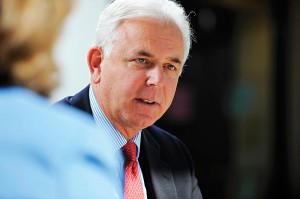
Five alumni and graduates of the educational leadership certificate program took part in a Superintendents Roundtable to discuss leadership in Connecticut public schools. The discussion was moderated by Robert Villanova ’86 Ph.D., director of the Executive Leadership Program in the Neag School and former superintendent of schools in Farmington, Conn. It was organized by UConn Magazine and the Neag School of Education.
Participants included Alan Addley ’04 (ELP), superintendent in Granby (2,700 students); Pam Aubin ’99 6th Year, superintendent in Montville (2,800); Kathleen Binkowski ’87 (ED), ’95 Ph.D., superintendent in Plainville (2,600); Alan Bookman ’81 Ph.D., superintendent in Glastonbury (7,000); and Miriam Morales-Taylor ’08 (ELP), deputy superintendent in Hartford (22,000).
According to the Neag School of Education, nearly 30 percent of current state superintendents have completed education leadership programs at UConn.
What do you see as some of the most significant challenges for superintendents today?
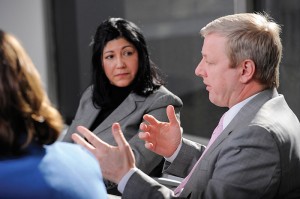
Aubin: There is a mismatch right now between high expectations in terms of accountability and the resources available to do the work. I think accountability is important, but you really have to develop trust and a relationship with your staff and your principals and clarify your expectations. As superintendent, you have to think very strategically and systemically about how you want to bring people to support change and help them meet your expectations with declining resources.
Bookman: A key part is the confidence that has been developed in you as a leader – by your community, by your staff – that they have faith that you are doing the best for the community and for education. If that confidence is not there, you will be battling every step of the way and less likely to get the resources and support from the community, including the board of education.
Binkowski: It’s a two-edged sword because the more that we do in terms of increasing student achievement, the more the community expects us to do – and they are proud of the fact that they don’t have an increase in taxes. It’s one of the frustrations of the position, but it can also be a rewarding piece because you’re seeing a district move forward despite a lack of resources.
Morales-Taylor: In Hartford one of the many issues is equity: How do you find equity and how do you ensure that you meet the needs of diverse students? We have to be in balance, but with higher expectations, the superintendent has to face the issue of how you provide student resources.
Addley: A challenge is changing demographics, the extension of diversity and social justice. But I think that sort of rolls into the bigger picture, which is preparing all the kids to be participants in the 21st century.
Aubin: I agree. We’re seeing aging in our population, [and] a dwindling number of families that are two-parent wage earners and more single-parent families. We have to do a better job of being visible. I think that’s a challenge – engaging the community.
How has the challenge of engaging the community changed over time?

Binkowski: Communication has changed significantly with technology. As a superintendent I look at the volumes of information that flow through our office on a daily basis. That’s a complexity of the job that the public doesn’t understand – the superintendent needs a communications specialist to manage that information and to shape it to deliver a message to the district.
Bookman: There are different issues that we’re facing today that you wouldn’t face in other days. Today we need a communication technology person. Each time period requires something different.
How do you engage with the community?
Addley: As a young superintendent – two years into the job – I underestimated the relationship to the town. I’m building relationships in formal ways and informal ways – through technology, organizations, and networking. They need to know you’re listening to them. For example, we want to increase the number of students that come from the Hartford school system. The right thing to do, fundamentally, in my heart, is to continue to take in the children – as many as possible. But there is a financial burden that impacts us, and I have a responsibility to do right for those things. It’s a difficult balance.
Aubin: For our community engagement, it’s being willing to spend time with individuals, whether it’s spending a day in a school or going on a ride with the mayor around town to learn about the town’s history. It’s not so much the content, but starting to form a relationship.
Morales-Taylor: You are building the relationship with individuals by being part of the community. It’s important that you listen to what the goals are, what the priorities are, and you have to be honest with your community.
One of the notions out there is that being superintendent is a job that no one can do and no one would want to do. What motivated you to move to this level of responsibility and complexity?
Binkowski: I had a number of mentors who encouraged me to be a superintendent. Having the feeling that I could have an impact on an entire system really was the deciding factor in terms of moving forward. But I definitely needed that push.
Bookman: The mentors are a key part – somebody who is saying, “You would be great at this position.” The other major component is the internal desire to make a difference in a wider group of people.
To what extent are achievement gaps challenging your work?
Morales-Taylor: In Hartford, part of the plan for improvement is that elementary students have to improve four points on the state tests each year to close the achievement gap in order to bring us to where we’re supposed to be in 10 years. Most of the schools are achieving that. In order to close the achievement gap for special ed, however, I needed to increase support, because special ed students were so far behind. We’re putting in place a lot of professional development for special education in each school. Many of the teachers didn’t have training in teaching remedial reading and writing, so we are providing the resources to the school.
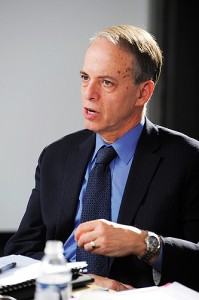
Aubin: In Norwich and Montville, I think we’re getting better with curriculum standards and establishing the standard practices. You’re seeing clear consistency across the state in terms of how we approach instruction.
Binkowski: I agree that we are becoming better at figuring out how to improve achievement for individual students. I go to every school in our district three times a year with central office staff. We’ve seen, over time, some incremental improvements in writing, math, and reading – but in the last couple of years, a pretty significant improvement in student achievement. As a result, that’s developed a sense of collective efficacy on the part of staff. We still have some struggles with the achievement gap. But we feel like we’re on our way to developing those skills.
Bookman: I hear this phrase “achievement gap,” and it always bothers me. What we have are students not doing as well as they should be. That’s what we should focus on. You’re not trying to hold back the people at the top. As long as we have students who are not doing as well as we think they should do on tests that measure what we think they should know, then it’s important to us. We’re very closely aligned with the University of Connecticut; many of the interns come to our school district and, each year, do a project. One of their projects was to work with those students who we would consider to be at the “not meeting proficiency” level, and they were able to use the data to pinpoint needs for each individual student and work with those students. And the results, the next year, were absolutely amazing. That’s what we need to concentrate on – each one as an individual.
You’re all comfortable about talking about teaching and learning, but I can’t help thinking there has to be a shift in goals, perhaps compared to the days prior to your superintendency. How much time do you spend on the various parts of your job?
Bookman: We’d like to think that we spend a good time with teaching and learning, but that’s the most difficult thing to do for me. I probably spend more time working with the people than teaching and learning. The politics is probably higher than perhaps I would like, probably half my time.
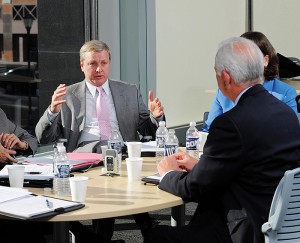
Aubin: I would say more of my time is spent with staff in classrooms than at the central office, working on curriculum.
Binkowski: Every Thursday, I have scheduled a visit to a school with central office staff, and once a month we spend a day with administrators looking at videos of teachers teaching and analyze those videos. So 25 to 30 percent of my time is spent on curriculum and instruction issues; the rest is budget and politics – nurturing and keeping the board up to date so I can collaborate with them.
Addley: No matter what the size of the district – in a huge district you can’t do everything – you’re only going to be able to stretch yourself so thin. I tend to think we sometimes underestimate the influence that superintendents have on student achievement, teaching, and learning. I spend one day a week in a school – a full day. I couldn’t do that if I had a huge district. I firmly believe in building the capacities of the principal.
I was surprised to see that 30 of the 50 states don’t require any special superintendent preparation. The Neag School designed a program for superintendent preparation. How much has preparation for the superintendency influenced your work?
Binkowski: You have to be able to really shepherd through and understand the legal implications of nonrenewal negotiations and budget increases.
Aubin: Those are absolutely areas that are unique to superintendency. Current experts in the field from various demographics were brought in and that really helped give us an insight [into a range of issues].
Binkowski: I think that the Ph.D. program was very rigorous and demanding, and it prepared me very well for superintendency, in combination with the fact that I had a superintendent that was well respected and had many opportunities to learn some of the nuts and bolts of what I’d be facing. I think the internship is very important.
What attributes or skills do you bring to your job that you think are shining examples of what make you successful?
Addley: You have to be a visionary, have integrity, and be able to inspire people. Those are things to me that have always been integral to leadership.
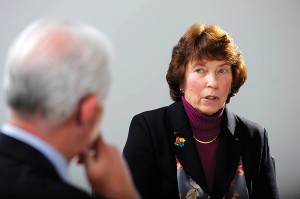
Aubin: You have to be resilient, too. People are stressed and you’re in budget forums and that kind of thing – it’s not you, personally, that they are attacking.
Morales-Taylor: You have to be able to ask for advice, knowing that you have to make the final decision. You have to show the community that you are leading the district.
Bookman: Developing relationships is such a key part of the job. If you don’t have the relationships, it’s so much harder to get anything accomplished. Also, you have to have a healthy sense of yourself, but at the same time, you can’t be invested in yourself. Everybody else has answers that are just as good.
Binkowski: My board has told me that one of the things they think is important in a superintendent is the ability to communicate very complex issues and problems that we deal with in a way that the unschooled mind can understand. Communication, first and foremost, is something the public looks for.
I enjoyed your being here today and enjoyed our conversation, and I wish you the best in leadership in the times to come.


